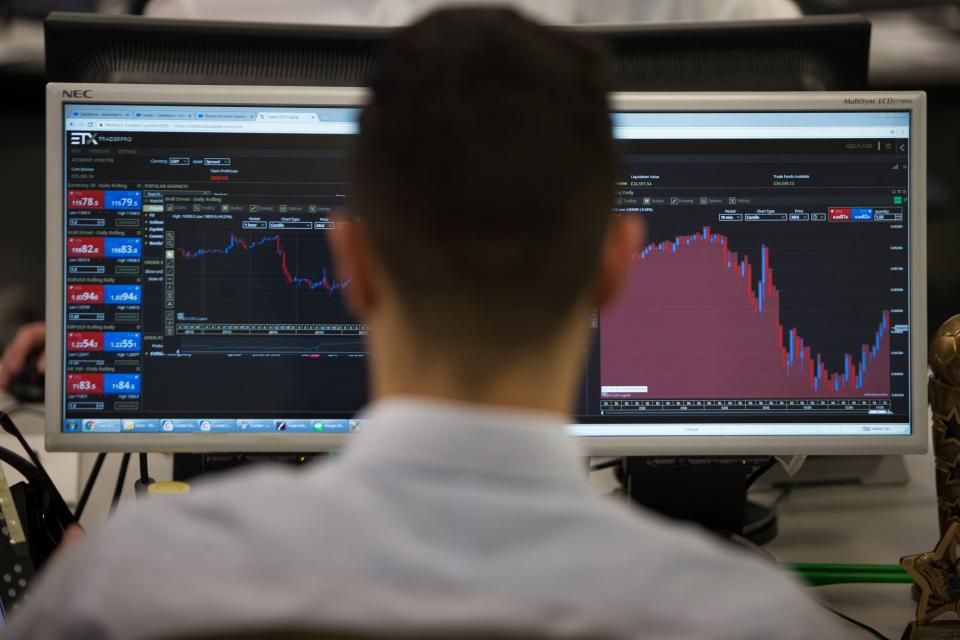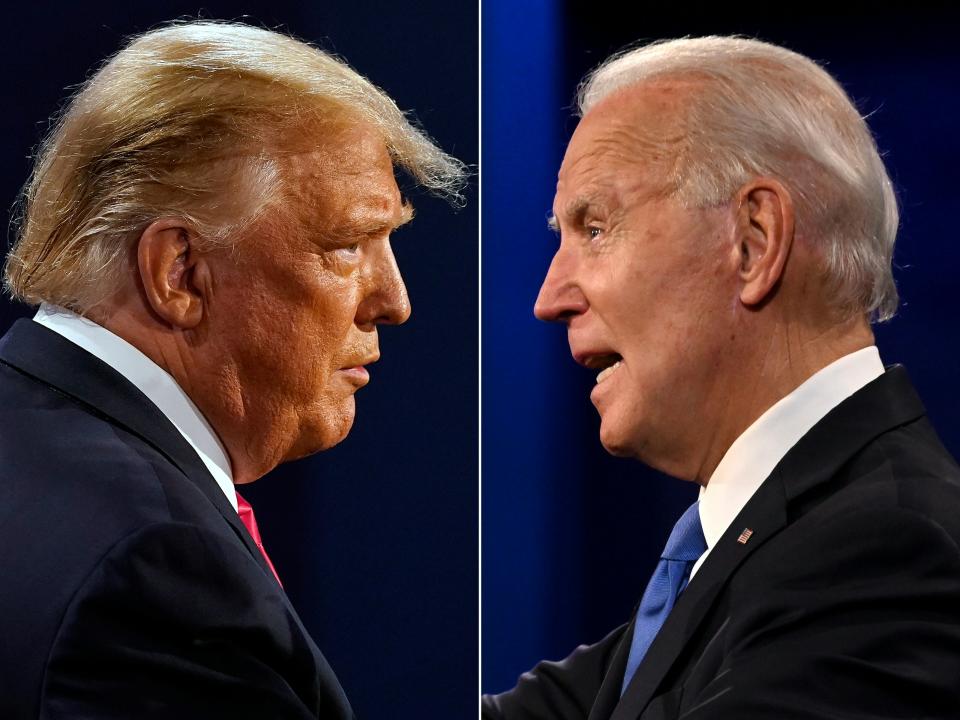European markets brace for tumultuous week, US election, BOE rate meeting

Investors are once again in for a rollercoaster ride as European countries go into national lockdowns.
Markets have taken a beating this week as a number of Europe’s largest economies, such as Germany and France, placed its nations under tighter restrictions amid a second-wave of the coronavirus pandemic.
The Europe-wide Stoxx 600 index (^STOXX) tumbled 5.6% this week. The DAX (^GDAXI) lost 8.6% over five days in Frankfurt. In Paris, the CAC 40 (^FCHI) lost 6.4% in the week.
UK prime minister Boris Johnson announced on Saturday that England will go into a month-long lockdown until 2 December to curtail rising coronavirus infections.
In the past month the FTSE 100 (^FTSE) — the leading benchmark for UK stocks — has slumped by more than 3% to below 5,600 points. It shed more than 4% in the past week alone.
An unbelievable year is about to go through its latest gauntlet as the United States is set to elect its new president.
Will Donald Trump serve a second term, or will Democratic opponent Joe Biden become the country’s 46th president? We find out on Tuesday.
On Thursday rate-setters at the Bank of England (BOE) and the US Federal Reserve (Fed) will meet to decide on monetary policy.
Weekend developments markets will also digest:
Watch: Prime Minister Boris Johnson announces month-long lockdown for England
UK: Second lockdown, BOE rate meeting, Brexit
In a dramatic U-turn Johnson announced that England will officially enter a month-long lockdown until 2 December, on Saturday.
The PM also confirmed that the furlough scheme, which was due to end on 31 October will be extended to help protect jobs.
“We are going to extend the furlough system through November. We will extend further until December,” Johnson said during a press conference.
The news comes after, Britain reached a grim milestone as the total number of coronavirus cases since the pandemic began hit 1,011,660 on Saturday.
With this in mind, BOE policymakers are set to meet on Thursday — with expectations that the central bank will ease monetary policy again before the end of the year. Experts at ING “expect another increase” in the stock of asset purchases by £100bn ($129.5bn).
The resurgence of COVID-19 and second England lockdown means its likely BOE will downgrade its August fourth quarter forecast.
In the background Brexit talks between Britain and the EU will continue. There hasn’t been much buzz in the last couple of days.
Other key releases: The final manufacturing PMI is released on Monday, with the services equivalent on Wednesday, and the construction PMI on Thursday.
Key company results:
Associated British Foods (ABF.L)— full-year (Tuesday)
Marks and Spencer (MKS.L), Stobart (STOB.L) — half-year (Wednesday)
AstraZeneca (AZN.L) — interims (Thursday)
Sainsbury’s (SBRY.L), Trainline (TRN.L) — half-year (Thursday)
Eurozone: Second wave COVID-19 market jitters, manufacturing, services PMIs and retail sales

Stock markets in Europe had their worst week since June as the impact of the second wave COVID-19 infections weighed, with investors facing a horror show next week.
Austrian prime minister Sebastian Kurtz announced over the weekend that the country will go into a second lockdown lasting for one month from 3 November.
Meanwhile, Germany said its “lockdown light” is set to come into effect on 2 November for four weeks to bring its latest wave of coronavirus under control. Bars and pubs will close under the new rules, but restaurants will be open for takeaways only.
On Friday, France reverted to its second lockdown, which will last until 1 December, in a bid to curtail rising infections.
The curbs imposed include the closure of bars, restaurants and other non-essential stores, as well as domestic travel and public gatherings being banned.
People in France will only be allowed to leave their homes to buy essential goods, for medical purposes and to exercise for one hour a day.
Ursula von der Leyen, the European Commission president, said that the EU, Britain, Norway, Switzerland and Iceland have accounted for 1.1 million COVID-19 cases. She warned that numbers would rise “rapidly.”
Data wise, there are the manufacturing PMIs on Monday, services PMIs on Wednesday, retail sales on Thursday, and German industrial production on Friday.
US: Election, Fed rate meeting and monthly non-farm payroll data

After what seems like a decade-long battle, America will finally find out who its new president will be on 3 November,
While the market reaction is largely dependent on who gets elected to lead the country, investors will also watch to see whether the Republicans retain control of the Senate, which is also potentially up for grabs.
Currently the Republicans hold the Senate by a majority of 53-47, under leader Mitch McConnell. If they manage to keep a hold of the Senate, the Republican Party will be able to block anything Biden does as US president if he is elected.
But, whatever way the election goes, something that will move markets is how the incumbent acts if he loses. Uncertainty or any sign that a potential handover will be plagued by resistance from Trump will worry investors.
The Fed will also hold a meeting on Thursday, while no major announcement is expected because of the election. Investors will still pay keen attention to what Fed chair Jerome Powell and US policymakers have to say in terms of stimulus regardless of who wins.
Away from the election, October’s US employment stats are due on Friday.
The rebound in the world’s largest economy has meant that the unemployment rate fell from its peaks in April of 14.7% to 7.9% in September. A trend which is expected to continue in October.
This month’s non-farm payroll report is expected to see another 700,000 jobs added compared to the 661,000 in September. While this figure is positive it still falls short of the 21.5 million jobs lost in March and April at the height of the pandemic.
The final Markit and ISM manufacturing PMIs are out on Monday, with factory orders on Tuesday and the final Markit and ISM services PMIs on Wednesday.
Watch: Strong GDP data limits European sell-off

 Yahoo Finance
Yahoo Finance 